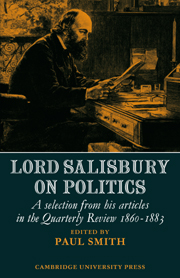Book contents
- Frontmatter
- Contents
- Preface
- List of abbreviations
- Editor's introduction
- Bibliographical note
- ‘The Budget and the Reform Bill’ (April 1860)
- ‘The House of Commons’ (July 1864)
- ‘The Reform Bill’ (April 1866)
- ‘The Change of Ministry’ (July 1866)
- ‘The Conservative Surrender’ (October 1867)
- ‘The Programme of the Radicals’ (October 1873)
- ‘Disintegration’ (October 1883)
- Index
- Cambridge Studies in the History and Theory of Politics
‘The Reform Bill’ (April 1866)
Published online by Cambridge University Press: 06 July 2010
- Frontmatter
- Contents
- Preface
- List of abbreviations
- Editor's introduction
- Bibliographical note
- ‘The Budget and the Reform Bill’ (April 1860)
- ‘The House of Commons’ (July 1864)
- ‘The Reform Bill’ (April 1866)
- ‘The Change of Ministry’ (July 1866)
- ‘The Conservative Surrender’ (October 1867)
- ‘The Programme of the Radicals’ (October 1873)
- ‘Disintegration’ (October 1883)
- Index
- Cambridge Studies in the History and Theory of Politics
Summary
INTRODUCTORY NOTE
Despite Gladstone's May 1864 speech and the encouragement offered by the success of Northern democracy in the American Civil War, the cause of parliamentary reform seemed destined to frustration as long as Palmerston endured. But the limits of his endurance were clearly approaching, and there was a general expectation that when he went the unleashing of pent-up Liberal energies would bring rapid movement on the political scene. Writing in the Quarterly just before the general election of July 1865, Viscount Cranborne (as Lord Robert had just become) gloomily envisaged the succession of Gladstone and a new onrush of Reform. At least, however, as Derby told Disraeli, a Radical trend under Gladstone might, by causing a reaction, do something to reinvigorate the Conservative party, which emerged from the 1865 election slightly weaker (about 290 seats) than in 1859.
Palmerston died at last in October 1865, and was succeeded by Russell, with Gladstone as leader in the Commons. The new ministry, needing Radical backing, could hardly dodge the question of Reform. At first there was some disposition to procrastinate by taking up the Palmerstonian Lord Elcho's suggestion of a commission of enquiry, but the insistence of the Radical W. E. Forster on a bill instead of a commission, as a condition of his joining the government, precipitated the decision to produce a definite measure. At the same time, the demand for more information was appeased by setting the Poor Law Board to work on the compilation of extensive electoral statistics.
- Type
- Chapter
- Information
- Lord Salisbury on PoliticsA selection from his articles in the Quarterly Review, 1860-1883, pp. 193 - 225Publisher: Cambridge University PressPrint publication year: 1972



